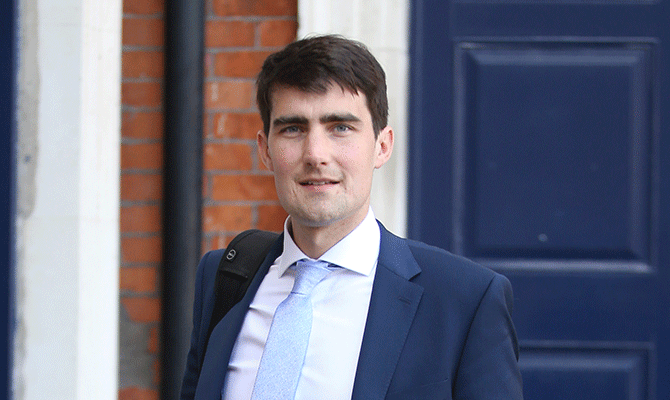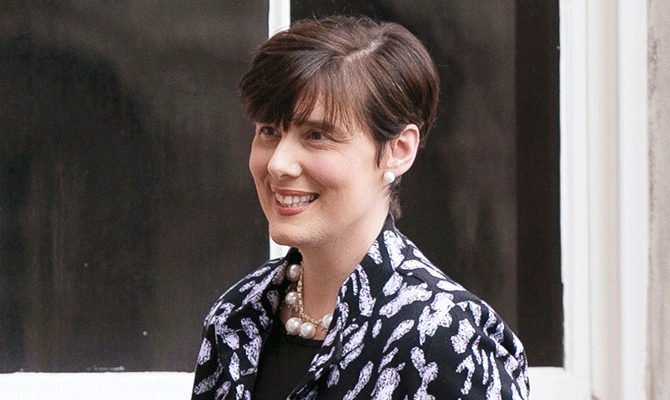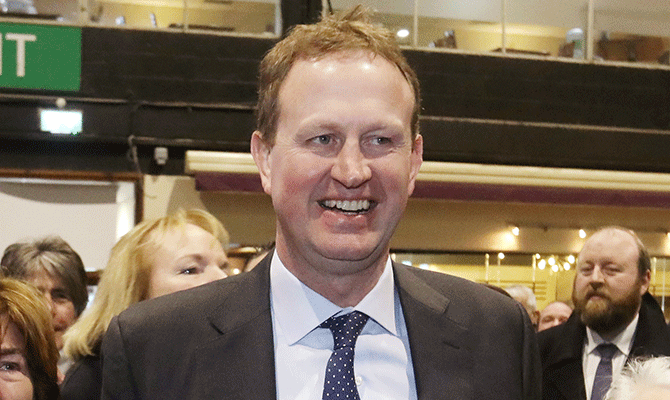
Jack Chambers
HOW TO explain the rapid elevation of 29-year-old Jack Chambers – already one of the top newly appointed junior minsters (finance) – to the post of chief whip and a super junior minister that attends cabinet? The defenestration of Barry Cowen is the answer, in more ways than one. But the brash, right-of-centre Chambers reflects everything that internal party critics say is wrong about Fianna Fáil and its leadership right now. Chambers has caused friction on all sides with his clumsy, dictatorial chairmanship of his first all-party whips’ meeting. If Micheál Martin wants to unite his party behind him, the appointment of Chambers may not be the cleverest move.
Barry Cowen’s appointment to cabinet was down to Micheál Martin’s felt need for a minder and, while Barry is not the intellectual power house his brother (ex-taoiseach Brian) was, he still possesses the Biffo gene – a quality sometimes needed to rein people into line. Jack is not even 30 (he hits that landmark in November), but he is loyal, wordy and aggressive, and Martin does not have many political hitmen by his side.
Another factor in Chambers’s successful career to date has been the alliance between the Chambers and Lenihan families in Dublin West, with Jack’s father, Frank, being constituency party chairman and aide to the late finance minister, Brian Lenihan. Chambers Snr, a specialist in pain management at the Mater Private, was personally close to Brian and attended him in his final weeks. Frank and Jack are both anti-choice and Jack took a lot of stick on social media when he made clear his opposition to the Repeal the 8th referendum. Jack is a qualified doctor and also has a law degree from TCD.
At one point, the dynastic Dáil succession was about to progress via Anita Lenihan – sister to Brian and ex-minister Conor – but she failed to go forward at the 2014 local elections. This told against Anita when she stood at the selection convention for the 2014 by-election, where she was defeated by Cllr David McGuinness, then seen by party HQ as a likely general election candidate and part of the reconstruction of the party.
What happened next is almost a metaphor for the trajectory of FF under Martin. McGuinness did surprisingly well in two by-elections, polling 21.7% in 2011 (just months after the near wipe-out of the party in the 2011 general election) and 17.5% in 2014, showing he would definitely take a Dáil seat in a general election. However, McGuinness was deposed in favour of the decidedly middle-class Jack Chambers (both parents are senior consultants, with mum a psychiatrist) at the selection convention for the 2016 general election. McGuinness stated openly that he obviously came from the “wrong side of the tracks” and accused the local organisation of being anti-working class (see The Phoenix 25/3/16).
It was true that Chambers topped the local election poll in 2014 with 2,603 votes in Castleknock, nearly twice McGuinness’s vote of 1,360 in Mulhuddart. However, McGuinness had to contend with established and very popular, left-wing candidates like Sinn Féin’s Paul Donnelly and the Socialist Party’s Ruth Coppinger – both were to become TDs – while Chambers had no such competition in a larger population.
However, with the Lenihans as well as the chairman of the constituency party (dad) and also party HQ dropping McGuinness to back him, Jack could hardly fail to beat McGuinness. Whatever the circumstances, the real point is that either candidate would have taken a Dáil seat, but the young, middle-class Chambers fitted the image of the ideal candidate or TD that Martin wanted to promote.
The popular view of Martin’s FF in recent years is that of a once constitutional republican party that decided for electoral reasons to abandon this ‘old-fashioned’ ideology and demonise Sinn Féin. But parallel to this U-turn was the abandonment also of its once social-democrat appeal to large sections of the working class. The obsessive quest for the middle-class vote that had defected or was borrowed by Fine Gael at the 2016 general election meant not only a vilification of Gerry Adams, Mary Lou et al, but also a general shift to the right. This demanded a more middle-class image, middle-class politics and middle-class candidates with older, soft left policies blurred to the point of extinction.
CONSERVATIVE TONE
That FF increased from 20 seats in 2011 to 44 in 2016 has been construed as a resurrection and it was certainly a mini revival. But some of the ‘newbie’ TDs elected in that ‘revival’ were anything but traditional and a distinctly conservative tone emanated from some of them. Lisa Chambers (no relation), James Brown and Jack were the most obvious such personalities and – along with more established frontbench members like Michael McGrath and Dara Calleary – helped the transition from a populist party to a more acceptable middle-class, liberal and infinitely less-popular party.
One result of this was that veteran Limerick TD and minister Willie O’Dea – probably the party’s most popular vote getter in modern time – found it harder to mobilise support for his regular budgetary tactic of demanding increases for social welfare and OAP recipients. He found that the usual resistance from McGrath and Calleary was supplemented by Jack and others in recent years (see The Phoenix 6/9/19 and 10/8/18).
Shortly after he was appointed to the frontbench as defence spokesperson in 2018, Jack joined a panel of bellicose speakers – Professor of International Relations at the UCD Centre for War Studies, Ben Tonra; and FG’s Máiréad McGuinness MEP, fresh from her demand that Ireland reconsider its neutrality – at the McGill Summer School. Tonra and McGuinness demanded a greater arms spend and military budget, while Chambers regurgitated enthusiastically the party line in favour of Pesco, the enhanced EU military force that FF and FG had combined to vote through the previous December.
Incidentally, Chambers was anything but grateful at his rapid promotion to the frontbench (two years after he was first elected to the Dáil) and was most disappointed not to have been promoted straight after that election at the age of 25.
In the run into the 2020 election, the frontbench included lightweights like Anne Rabbitte, Margaret Murphy O’Mahoney and the callow Chambers, while Lisa Chambers was invested with the enormous responsibility of Brexit. Experienced parliamentarian Sean Fleming – chair of the Public Accounts Committee (PAC) – was not even on the frontbench, while others like Niall Collins (regardless of ‘votegate’) were less prominent than hitherto as Martin tried to present a lead team of gender-balanced and youthful faces. Martin and his handlers were trying to create a profile of a moderate, responsible party, but which ultimately became one with no clear identity.
In an effort to outflank other opposition parties, Chambers kicked up a fuss over the government’s shameless manipulation of the ‘money message’ device, which has been used to block any legislation the government doesn’t like. In June last year, Chambers announced he would seek support from his party’s frontbench to amend the standing order enabling the money message tactic. Other TDs had drafted such motions, but only FF could move such a motion on a weekly basis and so all eyes were on Chambers as this issue became more contentious.
However, FF’s boy general then went all quiet, while Martin did not use the confidence and supply deal to barter for any reform of the money message arrangement. Martin realised that the money message device would turn out to be useful if he became leader of a minority government trying to control the Dáil, so Chambers was told to forget about his reform, which he duly and dutifully did.
Chambers impressed his colleagues when he was drafted on to the negotiating committee in government formation talks (he picked up the title of climate spokesperson after Timmy Dooley was stripped of it over the ‘votegate’ issue). But Jack did not fare so well on the Claire Byrne Live climate change debate during the general election, where he lost the plot in loud and embarrassing style. Viewers’ angry comments dominated the aftermath, with comments ranging from “disgusted” and “aggressive” to “absolute meltdown”.
Now that Chambers is chief whip, his short fuse has caused another contretemps, this time over the manner of his refusal to deal immediately with items of business with the other whips in government and opposition parties. The first meeting of the whips had to be postponed, as government chief whip – then Dara Calleary – was not ready to proceed. By the following week, Barry Cowen had been sacked and, after Martin’s reshuffle, the new whip was Chambers, who entered his first meeting more like the political equivalent of Conor McGregor than Martin Luther King.
Meetings involving the whips are the most cordial of any of the Oireachtas committee meetings and a culture of consensus and non-adversarial behaviour, with Ceann Comhairle Seán Ó Fearghaíl as chair, normally prevails. Chambers brusquely informed the other whips that he was not prepared for business due to his very recent appointment and that the meeting would take place a week hence, ie the following Thursday.
DISMISSIVE MANNER

Norma Foley
The whips had been patient about the first postponement given the new government, but they feared that another delay could mean the non-appointment of chairpersons and members to five most important committees – finance, budgetary oversight, PAC, Good Friday agreement and European affairs. One of the whips requested that they meet the following Tuesday instead, but Chambers refused point blank and also clashed with both SF whip Pádraig Mac Lochlainn and Catherine Murphy of the Social Democrats. Even a proposal from the committee’s secretariat that they meet on Wednesday was rejected out of hand by Chambers.
What irked many of those present was not simply Chambers’s refusal to hold an early meeting, but his dismissive manner. At one point, Ó Fearghaíl delivered a short lecture about the normal manner of “consensus” and co-operation in which such meetings were held and, while he did not name Chambers, all the other whips construed his comments as being aimed at the chief whip.
Backstage chats between various party whips, Ó Fearghaíl and the FF leadership resulted in a more emollient performance from Chambers at last Thursday’s meeting. There the chief whip conceded on an argument about the number of opposition TDs on the committees, so there is now agreement on the parties’ share-out on each of them. But the dual delay in the whips’ meetings has meant a delay in the appointment of individual members and, with the recess beginning this week, the committees will not now be operating until the autumn.
Chambers is also coming in for flak over the serious embarrassment that saw several FF deputies voting against Fergus O’Dowd, the government nominee for the leas-cheann comhairle post. This defiance was more likely aimed at Martin than FG and it was conducted in a secret ballot, but the buck stops with chief whip Jack who did not see this coming.
Much of this is down to overall chaos in government and FF in particular, but a broader problem for Martin is that he has created a party that has been stripped of its political identity and his cabinet reflects that, as does his super junior and chief whip, Chambers. Public expenditure minister Michael McGrath is one of the most conservative members of the parliamentary party. Health minister Stephen Donnelly – a former management consultant, former Independent TD and briefly a most unlikely Social Democrat TD – is not seen by anyone as left wing. Calleary is close to McGrath politically and in socio-economic terms (although also a rival for the leadership); while Norma Foley, a classic gender-quota appointment, has yet to reveal any radical political preferences. Only housing minister Darragh O’Brien – a north county Dublin TD – can lay a small claim to be in the classic FF mould and even he is now being accused by SF’s Eoin Ó Broin of being “developer led”. Chambers rounds off this list of modernist FF political leaders who don’t seem to know what they stand for any more.
This is not merely a negative debating point for Shinners or Blueshirts to throw at the party, but more an existential dilemma for FF members. In any foreseeable election, FG will start off with a solid base of middle-class voters who, along with others in middle Ireland, will expect Leo Varadkar to protect them from the depredations of SF. Yet despite Martin’s hysterical rhetoric, these voters will not be looking to his party to fend off Mary Lou and her hordes massing outside the gates.
Conversely, working-class Ireland will not, as they did for generations, be looking to FF to protect them from the Blueshirts and neither will young people. Martin’s reinvention of FF as the responsible, anti-republican party of the middle class has not impressed its target audience, but it has certainly made a strong but negative impression on poorer people that used to vote for them. The appointment of the seemingly entitled doctor-cum-lawyer from Castleknock is just the latest manifestation of a party that has lost contact with a large part of its base.
FURTHER DECLINE

Jim O’Callaghan
Martin’s people believe that things will settle down, that the party will consequently rise in the polls and that the growing number of internal party critics are a disparate collection of malcontents that will not easily gel together. But the fact is that Jim O’Callaghan has become the clear leadership alternative, whether or not he is culturally at one with rural TDs or inner-city Dubs. And the most recent poll (Ireland Thinks), taken just a fortnight ago, shows a further decline to a frightening 12%. That means the party support in Dublin hovers around 6%.
Right now, young Jack is riding high as government chief whip although, incredibly, he is said to be disappointed at not being a member of cabinet proper. But if his party does not show a revival in the polls by early next year, then he and Martin will come crashing down.


















